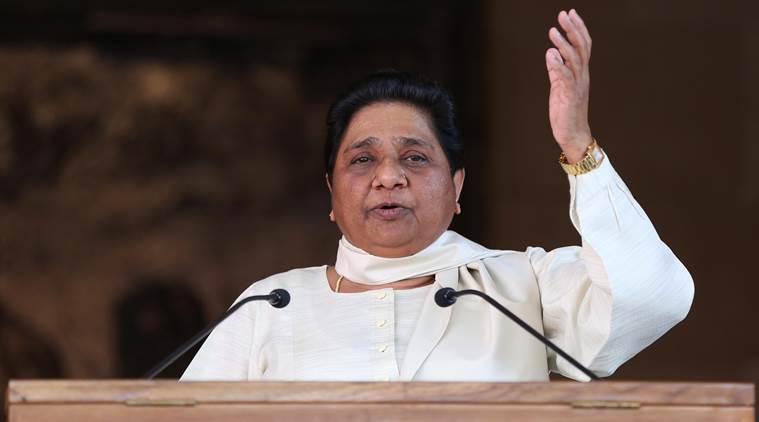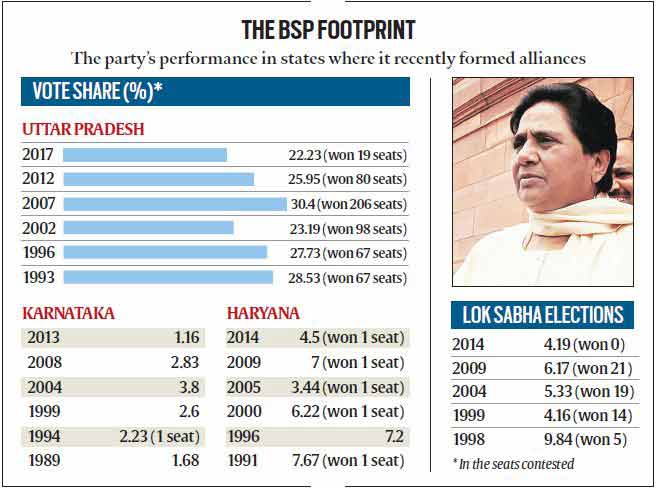 Mayawati had taken a decision against alliances after a bitter experience with the Samajwadi Party in Uttar Pradesh in 1993.
Mayawati had taken a decision against alliances after a bitter experience with the Samajwadi Party in Uttar Pradesh in 1993.
The BSP’s string of announcements of pre-poll alliances in the last two months — the latest being Wednesday’s announcement of tying up with INLD in Haryana for the Assembly and Lok Sabha elections — indicates a change in the party’s stand of contesting elections on its own.
Mayawati had taken a decision against alliances after a bitter experience with the Samajwadi Party in Uttar Pradesh in 1993. However, successive defeats in UP and other states, and failure to win a single seat in the 2014 Lok Sabha polls led the BSP to head towards alliances with regional parties in different states to maintain its place in national politics.
In February, the BSP announced an alliance with JD(S) for the polls in Karnataka, where Dalits comprise nearly 20 per cent of the population. The BSP will contest on 22 seats, including seven dominated by Dalits.
BSP buried its differences with SP and supported its candidates for the Gorakhpur and Phulpur Lok Sabha bypolls. The alliance defeated the ruling BJP on both seats, and the BSP decided to continue the alliance for the Rajya Sabha elections, UP legislative council polls and the 2019 Lok Sabha polls.
SP and BSP contested Assembly elections in alliance in 1993. SP contested on 256 seats and won 109, while the BSP contested 164 and won 67. The BJP won the maximum, 177 seats. But SP and BSP formed the government with Congress support and SP’s Mulayam Singh Yadav became Chief Minister. There was conflict between the parties as the BSP disagreed with various decisions of the Mulayam government, and on June 2, 1995, Mayawati decided to withdraw support. BJP extended support to BSP and Mayawati took oath as CM. The BSP-BJP government lasted just four months. Mayawati has now been out of power in UP for six years —from winning three-fourth of the seats in 2007.

There was a silver lining in the UP civic polls last year, when the BSP won two mayor seats in Aligarh and Meerut. However, over 73 per cent BSP candidates for mayor and municipal board chairperson lost their security deposits. This was the first time the BSP fielded candidates on the party symbol in the civic elections.
Insiders said the BSP may look for an alliance in Bihar and Madhya Pradesh, too. The RJD last year invited Mayawati for a joint ‘BJP Bhagao, Desh Bachao’ rally in Patna. But she did not attend, saying the BSP would not share a stage with any party until the contours of an alliance and seat-sharing formula for 2019 is finalised.
In Madhya Pradesh, BSP contested 227 seats in 2013 and won four, along with 6.42 per cent votes on the seats it contested.
According to BSP insiders, any alliance with BSP would be more beneficial for the other regional parties as BSP has shown capability to transfer its votes to partners — as evident in the Gorakhpur and Phulpur bypolls. In 2014 Lok Sabha polls, SP got 2.26 lakh votes and BSP got 1.76 lakh votes in Gorakhpur (total 4.02 lakh); while in Phulpur, their share was 1.95 lakh votes and 1.63 lakh votes, respectively (total 3.58 lakh). In the 2018 byelections, BSP-supported SP got 4.56 lakh votes in Gorakhpur and 3.42 lakh votes in Phulpur.
In Karnataka, a senior BSP leader said, the party would successfully transfer its Dalit support votes to JD(S) to develop a triangular contest against the ruling Congress and BJP.
In a statement on March 4, Mayawati said the BSP will support Congress in Rajya Sabha elections in Madhya Pradesh only when Congress MLAs support BSP candidate in UP. “…is haath de, us haath le” (give and take), she had said adding that in the previous election Congress nominee in Madhya Pradesh won with support of BSP MLAs. Congress MLAs supported the the BSP nominee in the Rajya Sabha election in UP.